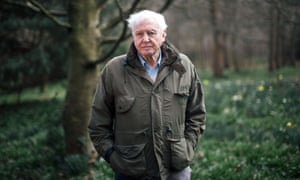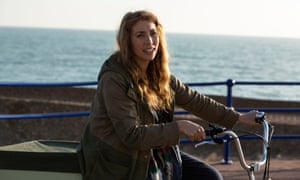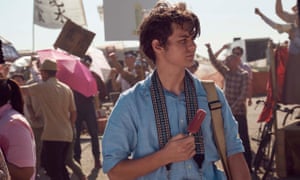Game of Thrones (Sky Atlantic/Now TV)
Climate Change: The Facts BBC One | iPlayer
Earth from Space BBC One | iPlayer
Back to Life BBC Three/One | iPlayer
Trust Me BBC One | iPlayer
Chimerica Channel 4 | All 4
So we have a new date for our diaries, to split the nation once more between those howling bereft anguish and those who wish it would all just go away: 20 May is now going to be Threxit day, the day Game of Thrones finally departs our screens.
Whether you’re a diehard fan or not, you can’t really deny that it has been part of our on-off national conversation for the last eight years or so, even more so than Harry Potter the previous decade; and, if you happen to live in Ulster, Iceland or Croatia, it will even have brought a grin to your local finances. It has made fantasy, that spoddiest of jester genres, acceptable (because it wasn’t really about that, ever, just power-politics limned in a simpler medieval brutality); shown that women can be powerful without somehow having to be hobbled with niceness: perhaps, above all, reclaimed television’s vital and urgent power, aided immensely by the franchised dreck of cinematic “blockbusters”, so spawning an exodus of screenwriting, directing, acting talent back to the living room.
This final series opener thus had a lot to live up to. It disappointed some, with its perceived failure to move things significantly forward: personally, I was delighted, as, after a nearly two-year hiatus, it gave us all a chance to remind ourselves precisely where we were. At Winterfell was where we were, barnacled in rime or covered in furs, though there have to be new definitions of intensity of “cold” to fully convey Sansa’s pass-agg mien on having to welcome Daenerys. The Wall has been breached, a dragon has been recruited to the undead Walkers, and all is set for a quite stupendous battle, possibly episode four or so, to rival, in scope and quite possibly in actual budget, the Normandy invasion.
In all this, it was a grand opener, shot through with dark humour and the occasional tendresse. It all got a little briefly Hollywood with the dragon-ride over Iceland’s striated mad beauties, and my knee jiggled in sympathy with Thrones purists who must have gag-reflexed when came a dragon-snort, half-love, half-jealousy, at Dany and Jon’s waterfall-clinch, but still… and Jon!
Jon Snow had a happy episode! Not only did he get to ride a dragon, and find out he was not a “bastard” (in the proper sense of the word rather than simply someone who carves you up on the motorway); but, even better, he’s actually heir to the Iron Throne. Good episode for Jon. (If bad news for his putative love life, but then again, 20 May is coming, and if you can’t shag your aunt before you die… one thing that particularly separates this from Lord of the Rings is its insistence on twincest and the like). And for us. I particularly loved what was surely a back-reference to the one misstep the casting directors have made, shoehorning in Ed Sheeran at the height of his unaccountable fame just because he was (unaccountably) famous, to act very badly as a soldier. As Bronn gossips in his naked frolicking, after the war with Daenerys that “boy Eddie… the ginger… came back with his face burned off”. These casting supremos know how to retro-suckerpunch.
More of Iceland, little of it good though, in a simply superb exposition of Climate Change: The Facts. My, after his brief and ongoing Netflix sojourn, Attenborough’s really been allowed to take off the gloves, hasn’t he? No wonder, after 30 years of his trying to tell us all of this, politely thirled both by his love of the BBC and their absurd insistence on “balance”.

Yet balance was what the many sharp scientists, most of whom have led the way in this, attempted throughout to show in this one-off (in many senses). Their language was always couched with “coulds” and “all indicators suggests”, as they told a quite simple horror story of, essentially, how our last chance to combat global warming has had the legs cut from under it by the recent deforestation of a third of global woodland for palm-oil growth, and the near-certain climatic tipping points this is entirely likely to engender. It was left to David Attenborough to quietly expound on how that immensely careful use of language by the least alarmist of scientists has been the very thing that has allowed politicians, oil companies, climate-change deniers, a tissue-thin excuse to delay. This was immense, and I do rather wish he’d taken the gloves off 30 years back.
We had (blessedly briefly) old footage of Lord Lawson of Winterfell, apparently only him, again and again, telling us essentially that even if the world did get warmer it was a good thing because, said this gentleman who used to keep his hands tight on our Treasury’s windpipe, it would mean fewer people dying of cold.
There’s still time, was the message, in both this programme and in Earth from Space, something I’d thought might be a bit gimmicky but turned out to be cloyingly watchable. We watched, rapt, as cameras from space zoomed in on elephants, individual seals, hippo-paths; importantly, though, on the interconnectedness of tiny planetary currents, oceanic and other. As Chiwetel Ejiofor nicely noted in this first (of four) he voices, we thought we were going looking into space; we are ending up learning a now-crucial lot about our planet. He had nicely prosaic hints as to ways forward, to gainsay, for instance, the destruction of half the world’s wildlife in 80 years. Eat all the food we buy. Avoid air-freighted food. Avoid beef and sheep, because they fart. This is something we can do, now.
Back to Life, set in Hythe with a fat sprinkling of Dungeness, has something of the same flavour of Don’t Forget the Driver, in what may be termed the new genre of sadcom, but a very different premise. Lass released from jail after 18 years, returning (against all our instincts) to pick up her pieces, locally, where everyone hates her and her own mother hides the knives. This six-parter is, in places, bitter as nuclear wind, in places life-affirmingly warm and funny, and Daisy Haggard knows, very much, what she’s doing, holding a vial of smelling salts up to our own lazy censoriousness with wit and style and melancholy, and expect awards.

Hard to get, yet, where the second series of Trust Me is going, with its crippled soldier-veteran in a Glasgow hospital where threat lurks, especially at night, with every pair of scissors, every abandoned nurse-station, as we thrust power ever further into beeping machines and hence hugely enable one dodgy human’s intervention. So far, so very tense, for the first of four, and I for one Trust It, even if you might never trust late-night wards again.
In Chimerica, Lucy Kirkwood’s so far splendid adaptation of her own play, we get a killer line at the start of the first (of four) which sums up much of what will follow. “She [a protesting woman] wants to know what happens after you get a dream of democracy,” asks a translator, for a photographer in Tiananmen Square, 1989. “We know what China is dreaming of. What is America dreaming of?”

The gung-ho snapper moves on from Pentax to digital Canon, and moves on from global fame, having snapped the man who stood against the tanks in the square, to ignominy. He adulterates a picture in Syria, today, for greater impact in a global half-hour news cycle, in a post-Trump, post-truth world. Obviously, it’s the very worst thing he could have done, braving the war zones but playing right into the prez’s tiny hands. The fallout, in the play, in the series, in real China, in real America, in real journalism, is enough to drive one to Westeros.




















![[Book Review] The Blade Itself (The First Law Trilogy) by Joe Abercrombie](https://bendthekneegot.com/wp-content/uploads/2018/01/1516047103_maxresdefault-218x150.jpg)

















